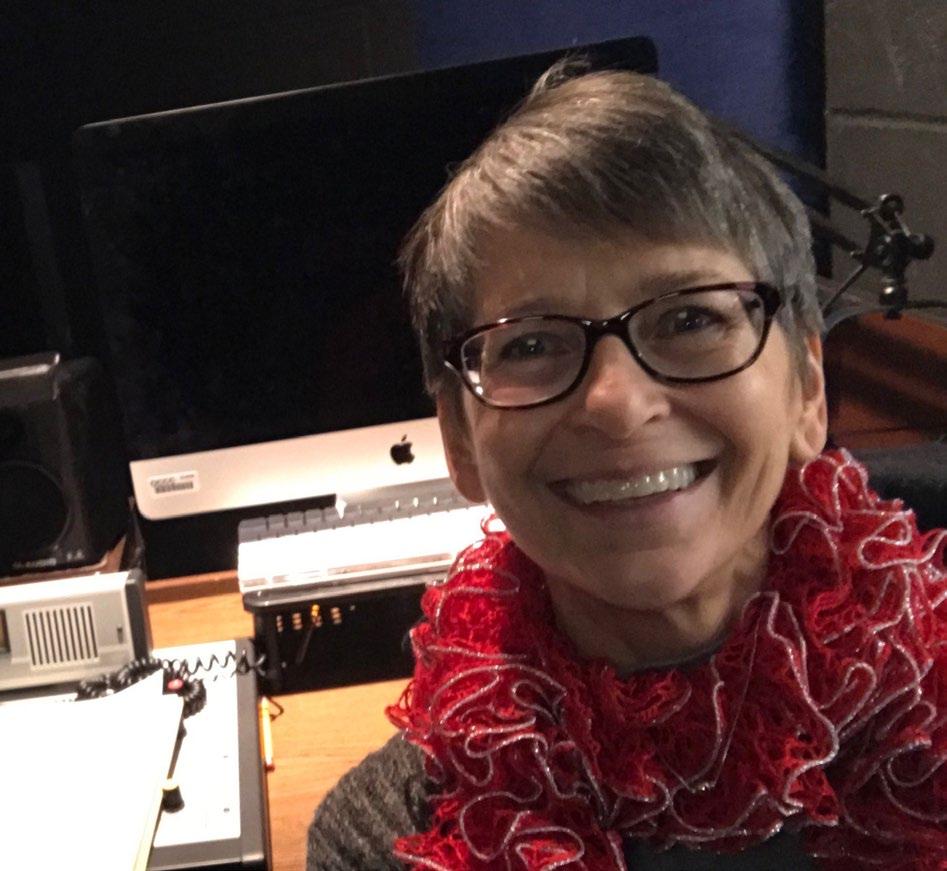
8 minute read
AuthoR CollABoRAtIons
hoW to MAke fRIends And fInd ReAdeRs
By Marianne Sciucco
Advertisement
In 2013, when I published my first novel, Blue Hydrangeas, an Alzheimer’s Love Story, I was like most new indie authors: I had no idea how to market it or find readers. My first efforts were disappointing, and I found myself struggling to find footing in an overcrowded book market. The fact that my book was a sort of niche book on a difficult subject added to my frustrations.
In addition to being a writer I am a registered nurse with no formal training, education, or work experience in publishing, business, or marketing. I learned all I could on my own by attending conferences (online and in person), reading books and blogs, and participating in webinars and online classes.
Two years later my studies led me to the concept of Author Collaborations: Symbiotic relationships with authors writing in my genre to cross-promote our books and share each other’s audiences. It sounded interesting, so I decided to seek out authors of books about Alzheimer’s and dementia to build a marketing platform to serve all of us. Little did I know that seven years later I’d be one of six daughters of dementia at the helm of a global community of 350+ authors known as AlzAuthors.
THe STORY BeHInd AlzAUTHORS
The first person I contacted was Jean Lee, author of Alzheimer’s Daughter, a memoir. She’d written to me months earlier to tell me how much she loved my book and to ask if I would read hers and give my opinion. I thought her book was excellent and encouraged her publishing endeavors. When I approached her with the idea of working together she jumped at the opportunity. I asked if she knew of anyone else and she recommended Vicki Tapia, author of Somebody Stole My Iron: A Family Memoir of Dementia.
Vicki was a bit skeptical, wondering how it would benefit her to promote other authors’ books. Jean and I reasoned that caregivers need a variety of good books and other authors are not our competition. There’s strength in numbers, we said, and we could all support each other and our readers. Vicki decided to give us a chance, and the three of us embarked on a month-long campaign in June, 2015 during the Alzheimer’s Association’s Alzheimer’s and Brain Awareness Month, piggybacking onto an established, national movement. We posted about it on our blogs and shared it on our social media, primarily Twitter and Facebook. We created our own hashtag, #AlzAuthors.
Our success at this encouraged us to join forces once again during National Caregiver Appreciation Month in November. We called it the “#AlzAuthors: Ending the Isolation of Alzheimer’s” campaign and again posted on our blogs each week, shared on Twitter, and hosted a Facebook event. This campaign also met with success, and we realized we were on to something. Plus, we enjoyed working together, sharing our stories and helping readers find our books.
HOw we’ve GROwn
Our next endeavor in 2016 was much bolder. We launched our own AlzAuthors blog featuring a new author and book each weekday in June, Alzheimer’s and Brain Awareness Month. We also cross-blogged to our own personal blogs. It was a challenge to find 20 authors willing to post with us, an unknown entity, and to get the posts ready each day, but when the month ended we decided to continue, although on a once a week basis. Each new post is promoted on AlzAuthors’ own Twitter, Facebook, Instagram, and LinkedIn feeds, and to our audience of authors and Friends of AlzAuthors via personalized emails. To date, we have featured more than 300 authors and are scheduled six months ahead. Authors now seek us out.
Since 2016 our management team has been joined by three more talented authors and daughters of dementia dedicated to Alzheimer’s awareness: Kathryn Harrison (Weeds in Nana’s Garden, children’s’ literature), Ann Campanella (Motherhood Lost and Found, memoir), and Susan Landeis (In Search of Rainbows, memoir). Each of our admins brings special and much needed skills to the organization. Five of us hail from across the United States and Kathryn joins us from Canada. We communicate and manage AlzAuthors using email, Slack, Zoom, text messages, and telephone calls.
MORe GROwTH
As the blog expanded we added the AlzAuthors Bookstore and became wHAT we leARned
Amazon Affiliates to help raise funds to support our organization. We also developed a resource page of helpful organizations we partner with, and host group book sales once a year. Other ventures include our podcast, Untangling Alzheimer’s and Dementia, virtual events featuring our authors in panel discussions, Custom Caregiver Collections, and more.
Our collaboration has taught us a great deal about cross-promoting, our audience, and our authors. From the start, Jean, Vicki, and I worked well together and were dedicated to our mission, but a few authors who agreed to collaborate with us on those early ventures did not or could not share our enthusiasm or stay active for long because of one reason or another: personal issues, a high-powered job, an author’s own progressing Alzheimer’s. This led to our carrying the full load, and since this was a collaborative effort there was disappointment, and in some cases, hard feelings for those we felt let us down. We learned to choose our partners with care, and made our expectations known before taking on a new admin.
We also came to understand not all our authors are interested in becoming full-time authors or in writing new books (although many have.) Some are still on their caregiving journeys. Others are living with the disease themselves. Most wrote their books long after their dementia journeys ended and are ready to put their dementia years behind them and move on. Yet we maintain a core of authors who continue to write about dementia and caregiving or in other genres and want to promote their work and raise Alzheimer’s awareness. They are the driving force behind our success.
We also learned every dementia story is different and it’s important to respect those differences and feature books and blogs that speak to the experience of as many caregivers and families as possible. This sometimes leads to interesting discussions as to whether to take on a new book or author. Our authors are our greatest strength because they are not professional writers but ordinary people with compelling stories. Many are self-published. All are worthy of attention and have something of value to impart to readers.
Another important thing we’ve learned is our target audience is more than what we originally envisioned. When we were each living our own dementia stories we hungered for books and blogs to guide us and discovered a startling lack of resources. We each wrote the book we wanted to read. Recognizing that need, our mission has always been to help caregivers find written resources to support their caregiving needs, but our efforts have shown us they are often too consumed with their own daily difficulties and don’t have time to read. Some don’t want to read about a tough situation they are currently living. We shifted our focus to market not to just caregivers – we will never not address them – but to others involved with Alzheimer’s and dementia care: medical and nursing professionals, social workers, elder law attorneys, financial planners, support organizations, and nursing home and assisted living personnel.
wHeRe we ARe nOw
In seven years, without realizing it, we created an organization that fills a void, a niche. We are entrepreneurs of a global community of authors writing about the most important disease of our generation. We support each other professionally and personally. I experienced this myself when my stepfather was diagnosed with mixed dementia in late 2015 and I became his medical, legal, and financial representative. The support of my admin team was invaluable and much appreciated.
If you would like to start your own author collaboration here are some tips.
13 TIpS fOR STARTInG An AUTHOR COllABORATIOn
1. Choose your partners with care. You will work closely together on a shared mission.
2. Brand your group. Come up with a catchy name, a mission statement, an easily recognized logo.
3. Stick to your purpose so readers aren’t confused.
4. Set a schedule and keep to it so readers know when to expect to hear from you.
5. Establish a few guidelines for which authors/ books to include. Evaluate books and authors critically. Analyze the writing, the reviews, and the author’s platform. Expect them to promote their involvement with your collaboration.
6. Build social media pages for your group and post to them each day. Monitor and respond to feedback. Create your own hashtags and use them.
7. Offer a convenient, private way for admins to communicate, i.e. Slack, Google Chats, Skype.
8. Offer a convenient, private way for members to communicate, i.e. a Facebook group.
9. Keep it fresh – run group book sales and other special promotions.
10. Develop a mailing list and use it each time a new post or podcast is published. Fill the newsletter with author events and shout outs as well.
11. Reach out to others working in your field, i.e. book bloggers and reviewers, organizations, agencies, and cross-promote with them on their websites, blogs, and social media.
12. Consider becoming an Amazon Affiliate to help raise funds to keep the collaboration alive.
13. Understand it takes time – perhaps years – to build a following.
About the Author
Marianne Sciucco writes contemporary and YA fiction. She’s not a nurse who writes but a writer who happens to be a nurse. A lover of words and books, she dreamed of becoming an author when she grew up but became a nurse to avoid poverty. She later brought her two passions together and writes about the intricate lives of people struggling with health and family issues.
Her debut novel, Blue Hydrangeas, an Alzheimer’s love story (2013), is a Kindle bestseller, IndieReader Approved, a BookWorks featured book, a Library Journal Self-e Selection, and a 5-star Readers Favorite. She recently published a short prequel, Christmas at Blue Hydrangeas, a Cape Cod Bed & Breakfast Story. Marianne’s work with Alzheimer’s led her to help found the organization AlzAuthors, which vets books and blogs about the dementias for those who need to read them.
Marianne has also published a young adult novel, Swim Season, which was chosen as an “Official Selection” in the Young Adult General Fiction category of New Apple’s Annual Book Awards for Excellence in Independent Publishing in 2017. Swim Season is based on the author’s 11 years’ experience as a Swim Mom, and the longest book she hopes she’ll ever write.
A native Bostonian, Marianne lives in New York’s Hudson Valley and, when not writing, works as a campus nurse at a community college.

You may follow Marianne’s Adventures in Publishing on her website, Twitter, and Facebook.
www.mariannesciucco.com/ www.twitter.com/MarianneSciucco www.facebook.com/marianne.sciucco.1
COnneCT wITH AlzAUTHORS https://alzauthors.com/ https://twitter.com/AlzAuthors https://www.facebook.com/AlzAuthors/ https://www.instagram.com/alzauthors/ https://www.linkedin.com/company/alzauthors/
Many authors get so wrapped up in the writing and publishing process that they do not begin thinking about marketing their book until after it is published.
The unfortunate reality is that if you ignore the need for marketing, you may not see the return on investment with your book that you were hoping for.
Building up an audience of ideal readers takes time. You require clear messaging that resonates with them. You also need a wellthought-out marketing plan to help you engage with and nurture them. Social media and email marketing, lead magnets, and podcast guesting strategies are just some of the marketing that I co-create with my clients over a six or nine-month period. It is not something that can be whipped up overnight after you’ve reached Bestseller status on Amazon.
How do you find your audience?
Once you’ve determined who your ideal reader is, then you want to meet them where they









